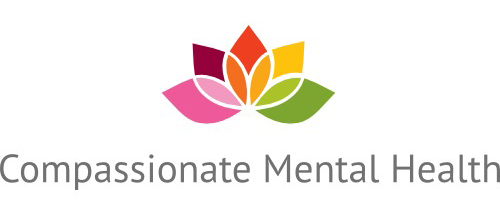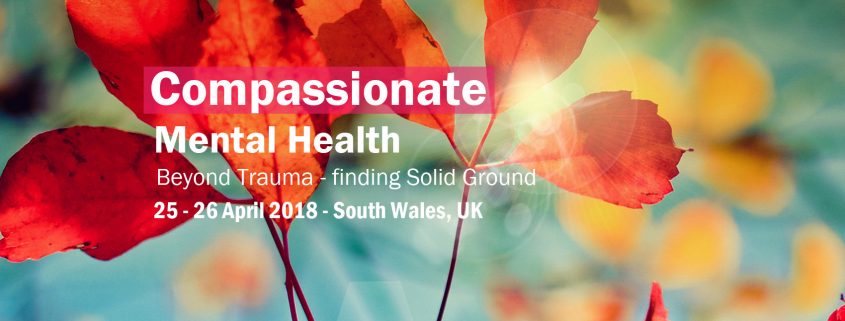Conference calls for compassion before drugs in mental health services by Jean Silvan Evans
Some 100 people concerned to change the face of mental health care in this country gathered for an inspiring one-day conference run by Compassionate Mental Health, that gave people the chance to hear leading voices in this urgent debate that has, finally, forced itself on to the agenda and to share their own experiences and hopes.
Part of the growing movement looking beyond the bio-medical model to centre, instead, on the need for compassion – importantly compassion for self as well as for others – the day set out to inform, inspire and empower both people working with mental distress and those, themselves, living with it.
The impressive range of speakers focused on the need to move away from an assumption that emotional distress was nothing more than a symptom of biological illness. Walking alongside the person with compassion was more effective than electric shocks and long-term medication, they emphasised.
Travelling Far
People travelled from all over the UK, and even as far as Holland and Canada, to attend the day that was packed with ideas and challenge, and a palpable atmosphere of compassion. Held in Insole Court, the lovely restored Victorian mansion in Cardiff, it was organised by freelance writer and journalist Brigid Bowen who was nominated for a Mental Health Media Award for a live show produced for BBC Radio 5 Live.
Brigid later told me that her experience of using mindfulness and meditation to recover from a serious mental health crisis in her early 20s was the catalyst for the day, and she had wanted to introduce people to the best of psychosocial approaches. Medication, she explained, might be needed in the short term, but understanding the social and environmental roots of mental distress and giving people access to psychological therapies was vital. Mostly she wanted to let people know that, with the right tools and support, a sustainable recovery is possible.
Speaking into Silence
Malcolm Stern, psychotherapist and director of Alternatives, opened the discussion by stressing it was important not to have a ‘realm of silence’.
People needed to be able to speak out their own truths and let their stories be heard. There was a need to create safe environments where people could talk openly.
Malcolm said his daughter Melissa, who died by suicide in 2014, had been ‘brutalised’ by the medical system and large doses of anti-psychotic drugs. It had taken her years to recover – mainly from the medical treatment rather than the mental health crisis itself.
Devastatingly, he described how fear of similar treatment prevented her seeking help when she became unwell again: ‘Melissa was afraid to put herself back into medical hands, and I now want to work with others to make sure our mental health services, are safe, healing places that people want to use when they are in crisis.’
Malcolm spoke about how his sister Beverly was also a casualty of the mental health system at a time when ECT was used extensively. Malcolm believes she never recovered from the onslaught of 55 electric shock treatments.
Poet and psychotherapist Jo Watson, quoted mental health campaigner, Eleanor Longden, in saying the question should not be ‘What is wrong with you?’ but ‘What happened to you?’
Malcolm helped to bring together the packed, busy day that never seemed rushed. From his first talk, Slaying our Dragons with Compassion, with its insistence that compassion made it possible to manage difficult conversations, he hosted group gatherings through the day, led one of the experiential workshops, and brought the day to an end in a glow of community.
Journey towards Self Compassion
Jonny Benjamin, award-winning mental health campaigner, focused on the need for self-compassion and self-forgiveness and spoke of his long journey to find it. After years of mental illness and psychological treatment, he was ready to jump off a London bridge – until a stranger talked him out of it.
‘He just talked to me,’ said Jonny, ‘and I said more things to that stranger than to all the psychiatrists. He’d been through it. He told me I’d get better.
The police were there by that time and they took me to hospital. But talking to that stranger for 20 minutes gave me hope. Care, compassion, empathy, makes all the difference.’
Jonny said the more he spoke about it, the less shame and embarrassment he felt. But forgiving himself was hard – you didn’t ‘beat up yourself’ over cancer but you did over mental health. Learning not to hate yourself was a great challenge but he had found it was possible. And with self-forgiveness had come self-compassion.
Getting to Know our Selves
Clinical psychologist Rufus May and mental health trainer Elisabeth Svanholmer, who uses her own experience of living with voices to help others, talked of making friends with difficult mind states – the unfamiliar, the intense, the uncontrollable – and focused on the need to recognise and accept that we are made up of ‘multiple’ selves.
Multiple selves included a critical self, an anxious self, an angry self, and so on. People need to connect with these different selves – talk to them, get to know them.
We need to be comfortable around our own aggression – otherwise it would ‘take over the show’. People should feel safe. Safe spaces were needed to explore ‘the tricky, scary stuff about life’.
Compassionate health trainer Andy Bradley, who was named by NESTA as one of Britain’s New Radicals, talked of the need to move from the traditional fight or flight reaction to a more compassionate ‘intend to friend’. Fear was designed into the mental health system. ‘What,’ he asked, ‘if it were love, instead?’ But people at the conference were already converted. ‘How can we convert other professionals?’ he asked.
Creating Safety
Dr Charlie Heriot-Maitland, clinical psychologist and researcher at King’s College London, spoke of compassion focused therapy for psychosis.
To help people struggling with distress, he said, instead of trying to fix the distress, it was simpler to create a context so the mind could do its own healing. Compassionate contact could facilitate that.
We need to justify the importance of networks. We need compassionate relationships with others and with ourselves. The compassionate self holds together the multi-selves, it was a fruit salad not a smoothie, the critical, angry, anxious selves were still there – but the compassionate self was like the conductor of an orchestra.
Importantly, this was a day for building bridges between mental health professionals and people who had personal experience of living with mental distress. Psychiatrist Dr Sue Ruben talked about working with difficult to engage patients – especially those experiencing homelessness and addiction – and explored what the forward face of psychiatry might look like. She uses science and medication – but judiciously, and not always as a first resort. She emphasised listening to patients and treating them as individuals, and having the confidence to be yourself when working with people with mental health problems.
‘Within psychiatry lots of us try to do the best we can,’ she said. ‘If you walk alongside patients, there’s a lot they can teach you.’
Towards empathy and appreciation
A panel discussion and workshops on Open Dialogue demonstrated the effectiveness of the empathic, non-judgemental approach. Compassionate psychiatrists Dr Chris Salway and Dr Tom Stockmann were in conversation with two service users. Joanne Tudball told how she was now able to hold down a full-time responsible job, and had emerged stronger after a crisis that she saw as a breakthrough rather than breakdown. Francesca Collard shared her relief at coming off medication and being accepted as she was. She said she felt fortunate to have been able to access this revolutionary approach, which is now becoming the dominant model for mental health services in Cork.
Searching sessions on mindfulness were given by psychiatrist Dr Florian Ruths, who described how discovering he was merely mortal rather than a “hypo-human” enhanced his capacity to appreciate the simple things in life. He said mindfulness meditation can increase self compassion and prevent relapses of depression.
Social innovator Nadine Denneth gave a powerful talk about how caring for her father with bipolar and dementia had led to her setting up N.ableD – a social enterprise to help people manage their own health. And how persuading the doctors to allow her dad to taper off the anti-psychotic medication he’d been taking for 40 years unexpectedly improved his symptoms of dementia, so much so it was described by nursing home staff as a miracle cure.
Unexpected insights into mental illness came through drama by Elaine Paton – who read extracts from a new piece about suicide and depression – and poetry by Jo Watson, and there was testimony from people with personal experience of mental distress.
A Compassionate, competent team
The event was expertly and warmly chaired by Sarah Stone, director of Samaritans in Wales, and managed on the day by a team of volunteers ably led by Cardiff based business coach Julia Lewis.
Sarah Stone opened the day by introducing the Wellbeing team – Andy Bartley, Marta Stothers and Joaquin Perez-Riquelme – and encouraging people to look after themselves and each other:
“Do talk to each other, listen to each other, enjoy the day. You may encounter views which are different to your own, please hear and respect them. This is a day for reflection and connection.”
Exceptionally positive feedback from delegates confirmed the event succeeded in creating a compassionate community for the day, with many asking for more opportunities to further the development of a compassionate approach to mental health.
Keep up to date with future events and the Compassionate Mental Health Blog at the website www.compassionatementalhealth.co.uk; Facebook @compassionatementalhealth; and on Twitter @CompassionMH
Compassionate Mental Health are now on their fourth Gathering: Beyond Trauma – Finding Solid Ground. on April 25,26th 2018 at Buckland Hall BOOK to be part of the movement for mental health reform and Renaissance.
Pre Conference Training: Developing Our Compassionate Minds with Dr Charlie Heriot Maitland on the 24th April 2018. BOOK here to join Charlie for one day’s training. Come away with practical skills and a certificate. Guaranteed to make you understand the science of Compassion and how to use it in your work and life.




Trackbacks & Pingbacks
[…] It would be superfluous for me to provide another overview of the inaugural event myself, so I’ve decided instead to recall and explore some of my personal highlights. You can read Jean’s full article and systematic appraisal of the proceedings here. […]
Leave a Reply
Want to join the discussion?Feel free to contribute!